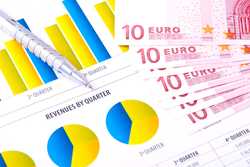How to Cash a Check

Our evaluations and opinions are not influenced by our advertising relationships, but we may earn a commission from our partners’ links. This content is created by TIME Stamped, under TIME’s direction and produced in accordance with TIME’s editorial guidelines and overseen by TIME’s editorial staff. Learn more about it.
Though paper checks have waned in popularity in recent decades, there are still many instances where you may find yourself the recipient of a payment on paper. Whether your Great-Aunt Marge sent you a Christmas check, you didn’t set up your payroll direct deposit in time, or you received a nice refund from the IRS, here’s a look at how to cash a check and access that money.
Cashing a check is probably easier than you think. There are multiple options depending on your financial institution, how you prefer to bank, and how you want to access the funds and when. Here’s how to do it.
While most people just say they’re going to “cash a check,” there’s actually a difference between cashing and depositing one of these documents. The option you go for will determine how and where you process the paper payment.
Cashing a check technically means to immediately process and trade the check for the same amount of cash. Depositing a check means you’ll put the payment into the account of your choosing, where the funds can then be accessed once the payment is processed.
You may not be able to cash your check right away if the amount exceeds a certain limit or if you don’t have access to the right financial institution.
Once you’re ready to cash your check, you’ll want to endorse (sign) the back of the check on the indicated line. You may also need to write your account number below your signature as an added verification step. This allows the bank to process the payment and also affirms that you are the intended payee.
In most cases, you’ll want to wait to endorse your check until just before you cash it. If you sign the check and then lose it, someone else might be able to deposit that payment into their own account.
In order to cash a check, you’ll need to show proof of identification. For most banks and check-cashing facilities, this means a valid driver’s license or state ID.
If you want to cash your check, meaning exchange it for cash on the spot, you’ll need to figure out where you can and should go. This depends on a few factors such as:
There may be limits to how much cash you’ll be given on the spot. The amount that is immediately paid out can depend on your account, your bank’s policies, the value of the check, and even the type of check you receive.
If you want to deposit your check instead of “cashing” it, you’ll need to decide how you prefer to do so. If you mostly bank in-person, you might want to drop by a local branch and make the deposit with a teller. Another option is to deposit the check using an ATM.
Alternatively, if your bank offers online or mobile-app check-deposit tools, you can begin processing that payment in seconds without ever needing to leave home.
If you cash a check where you already bank, there are no fees involved. You can also cash the check at the issuing financial institution, or whichever bank is written on the check, even if it’s not where you have an account.
In some cases, the issuing bank may charge you a fee to cash the check if you don’t have an account there. However, many banks will waive non-customer check cashing fees if it’s a check that the bank issued and can verify.
If you don’t have a local bank and the issuing bank doesn’t have a branch nearby, another option is to use a check-cashing service. These services are offered by standalone check cashing companies as well as money service counters at retailers such as Walmart.
The fees for these services will vary based on the type of check, the value of the check, and even your location. You may pay a flat fee per check or a percentage of the cashed amount. For example, Walmart charges a maximum of $4 to cash checks worth up to $1,000, up to $8 to cash checks worth more, and up to $6 to cash checks made out to two names. These are generally considered good rates; some check-cashing services charge as much as 6% of the check amount.
Every check-cashing fee you pay is money wasted, so try to avoid them whenever you can. Thankfully, there are several ways to do this.
Ways to avoid fees when cashing a check include:
In the future, you can also request that payments be sent via ACH transfer or direct deposit and avoid the check issue entirely.
Yes, you can cash a check even if you don’t have your own bank account. All you need, other than the original check, is a valid government-issued ID, such as a driver’s license.
To cash a check without a bank account, you can first try taking it to the issuing bank, assuming it has local branches. The issuing bank will be printed on the face of the check; a quick search online should reveal if it has a brick-and-mortar location in your area.
Many times, the issuing bank will waive any fees for non-account holders. However, there are some financial institutions that will charge a nominal fee for this service.
If you don’t have your own account and the issuing bank isn’t available in your area, you can turn to a check-cashing service. There are many standalone check-cashing companies nationwide, most of which typically charge a percentage-based fee. You can also go to one of the many retailers and grocery stores that offer this service. They may charge a flat fee or a percentage of the check amount.
Where you decide to cash a check depends on where and how you bank, and whether you are trying to avoid any check-cashing fees. Your options generally include cashing the check:
Third-party retailers and businesses will typically charge a fee to cash your check, and may limit the amount you can cash. Limits vary depending on the vendor and the type of check. It’s also worth bearing in mind that most states impose a check-cashing maximum of $5,000.
Your own bank won’t charge you fees for cashing or depositing a check. The issuing bank, on the other hand, may or may not charge non-customers for this service.
While you probably have many local options for cashing a check, there are a few places you shouldn’t go. These include:
If you take a check to a business that doesn’t cash checks, they won’t be able to verify the payment and won’t be willing to give you cash. Taking your check to a bank or credit union where you aren’t an account holder is fine if that financial institution is the one that issued the check. If it’s an unrelated entity, you may or may not be able to cash the check. And, if you can, you are almost guaranteed to incur fees.
Additionally, most check-cashing businesses and retailers have limits that vary depending on the type of check. If your check amount exceeds that limit, you’ll be turned away.
If having a bank cash your check isn’t an option, there are many local and national check-cashing companies and services that you can turn to, including retailers like Walmart. You’ll pay a fee and can only cash checks up to a certain amount, but will be able to access the money in a matter of minutes.
To cash a check, you’ll either need to visit a bank where you are an existing account holder or, in some cases, a branch of the bank that issued the check. These are your best options if you’re trying to avoid fees. You can also cash many checks at check-cashing businesses or retailers that offer check-cashing as a service, though either of those options will incur fees.
You can cash a check at a bank where you’re already a customer, or the bank that issued the check (even if you aren’t a customer there). You typically cannot visit another bank or credit union and successfully get your check cashed.
If your bank allows you to deposit checks at an ATM, there may be a delay before those funds are available. Depending on your history with the bank, the type of check, and the dollar amount, some or all of those funds may be held for one or more business days before being released.
The information presented here is created by TIME Stamped and overseen by TIME editorial staff. To learn more, see our About Us page.



